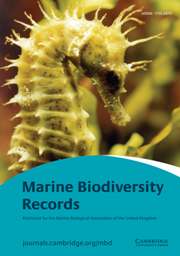No CrossRef data available.
Article contents
Phylogenetic analysis of yellow-bar angelfish (Pomacanthus maculosus) of the Persian Gulf using cytochrome b sequences
Published online by Cambridge University Press: 24 April 2013
Abstract
Pomacanthidae is a family of coral reef fish that consists of approximately 74 species. Ten species of these fish have been identified in the Persian Gulf, one of them being yellow-bar angelfish (Pomacanthus maculosus). The phylogenetic relationship of these fish was studied using 10 samples collected from three regions of Iran: Larak Island, Lengeh Port and Genaveh Port. To analyse mtDNA, 760 base pairs of the cytochrome b gene were amplified and sequenced. The target region of the mtDNA was amplified using the polymerase chain reaction (PCR) and then PCR products were analysed by the phylogenetic analyses of the DNA sequences based on Phylodraw and ClustalW software. Samples were aligned together and with other cytochrome b gene sequences of angelfish from GenBank. Comparison of the phylogenetic trees indicated that all samples belong to a monophyletic group, while comparison of the phylogenetic tree obtained from the cytochrome b gene of P. maculosus samples from the Persian Gulf and other angelfish in GenBank, showed that P. maculosus is closer to Pomacanthus semicirculatus and Pomacanthus imperator than other species of GenBank.
- Type
- Research Article
- Information
- Copyright
- Copyright © Marine Biological Association of the United Kingdom 2013


